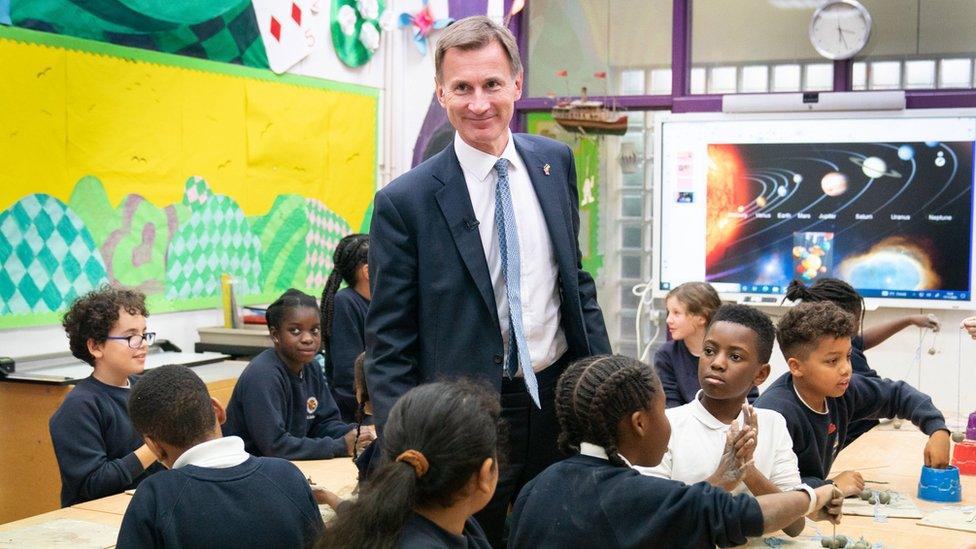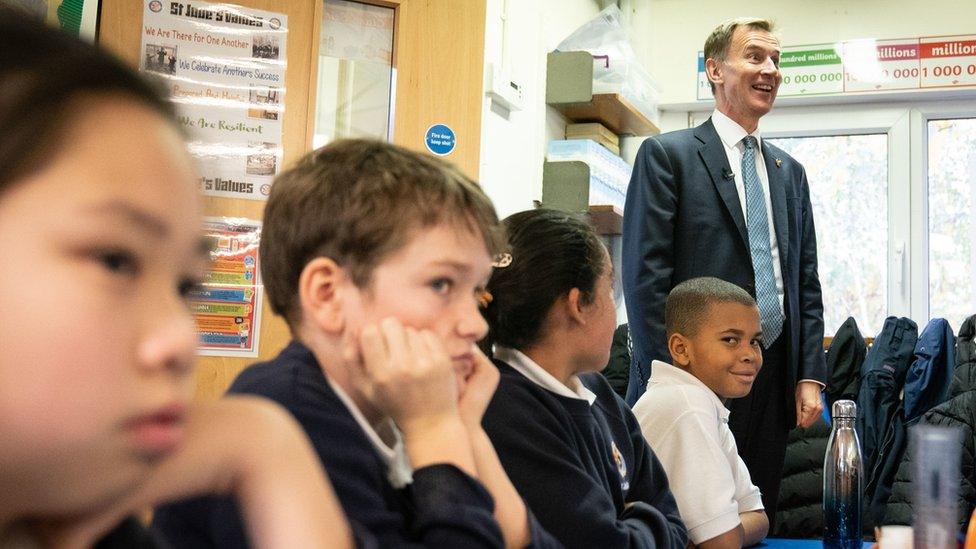London leaders say tax rises not the solution
- Published

The chancellor, Jeremy Hunt, announced a new package of new financial measures at the autumn statement
Raising council tax is "not the solution" to long-term pressures as finances remain "critical", say London councils.
In the Autumn Statement announced on Thursday, the threshold on council tax will be raised to 5%.
Borough leaders said the rise would put immense pressure on already hard-stretched residents.
While they welcomed the delay on the social care cap, huge funding gaps remained, they said.
The Chancellor Jeremy Hunt insisted his plan would get the UK through an economic "storm" and restore its economic credibility.
He announced that local authorities could increase general tax by 3%, plus another 2% to pay for adult social care from April.
A 5% rise would mean average bills in Bexley, Croydon, Havering, Sutton and Waltham Forest would go over £2,000 for the first time that month.
Last year, payments for Band D households in Harrow and Richmond rose above the amount as they joined Kingston as the only London councils to hit the figure.
London Councils, a cross-party organisation that represents London's 32 borough councils and the City of London, warned that the English capital's authorities had a funding gap of £700m.

Jeremy Hunt met pupils at St Jude’s Church of England Primary School in south London after delivering his autumn statement to Parliament earlier
Councillor James Jamieson, chairman of the Local Government Association, said: "While the financial outlook for councils is better than we feared next year, councils recognise it will be residents and businesses who will be asked to pay more.
"We have been clear that council tax has never been the solution to meeting the long-term pressures facing services - particularly high-demand services like adult social care, child protection and homelessness prevention.
"It also raises different amounts of money in different parts of the country unrelated to need and adds to the financial burden facing households."
Councillor Georgia Gould, chair of London Councils, said that borough finances remained in a "critical condition." She maintained that council tax was "not the answer" and said the rise made the cost of living crisis "extremely difficult for struggling households" and "it could never plug that £700m funding gap".
Adam Hug, leader of Westminster City Council agreed, saying: "By paving the way for higher council tax, the chancellor is sending local authorities down a dead end which will spell destitution for some while hardship just got harder for local people."
The social care cap, which would stop the state covering social care costs of more than £86,000 per individual, has been postponed for two years - a policy welcomed by borough leaders.
"We are pleased that government will provide extra funding for adult social care and accepted our ask for funding to address inflationary pressures for both councils and social care providers," Mr Jamieson said.
But mayor of Hackney, Philip Glanville, added a note of caution, saying: "While a social housing rent cap to help protect council tenants from further inflation pressures is welcome and called for, doing so without funding the black hole it creates in council housing budgets will cause long-term problems."
He added that a rent cap would create a £13.6m gap in Hackney's housing budget that would need to be filled through cuts.
'Demand on increase'
Councillor Shantanu Rajawat, leader of Hounslow Council, said: "Like councils across London we are already facing additional cost pressures which were not included in our budget for this year due to much higher inflation and rising prices, and the increase in borrowing costs due to increasing interest rates.
"These pressures come at a time when demand for our services is on the increase."
A spokesperson for Richmond Council said: "Richmond Council's budget faces immense pressure due to rising inflation. We don't want to have to ask residents to pay more, particularly during a cost of living crisis, but once again the buck is being passed to local councils and hard-pressed local people. "
Mr Hunt said the Autumn Statement would help restore the UK's economic credibility and added that the budget deficit - the difference between what the government brings in in taxes and what it spends - would be brought below 3% of output (or gross domestic product) within five years.

Follow BBC London on Facebook, external, Twitter , externaland Instagram, external. Send your story ideas to hellobbclondon@bbc.co.uk, external